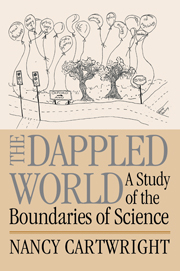Book contents
- Frontmatter
- Contents
- Acknowledgements
- Introduction
- Part I Where do laws of nature come from?
- Part II Laws and theier limits
- 4 Aristotelian natures and the modern experimental method
- 5 Causal diversity; causal stability
- 6 Ceteris paribus laws and socio-economic machines
- 7 Probability machines: chance set-ups and economic models
- Part III The boundaries of quantum and classical physics and the territories they share
- Bibliography
- Index
7 - Probability machines: chance set-ups and economic models
Published online by Cambridge University Press: 05 June 2012
- Frontmatter
- Contents
- Acknowledgements
- Introduction
- Part I Where do laws of nature come from?
- Part II Laws and theier limits
- 4 Aristotelian natures and the modern experimental method
- 5 Causal diversity; causal stability
- 6 Ceteris paribus laws and socio-economic machines
- 7 Probability machines: chance set-ups and economic models
- Part III The boundaries of quantum and classical physics and the territories they share
- Bibliography
- Index
Summary
Where probabilities come from
Ian Hacking in The Logic of Statistical Inference taught that probabilities are characterised relative to chance set-ups and do not make sense without them. My discussion is an elaboration of his claim. A chance set-up is a nomological machine for probabilistic laws, and our description of it is a model that works in the same way as a model for deterministic laws (like the Newtonian model of the planetary system that gives rise to Kepler's laws discussed in chapter 3 or the socio-economic machine of chapter 6). A situation must be like the model both positively and negatively – it must have all the relevant characteristics featured in the model and it must have no significant interventions to prevent it operating as envisaged – before we can expect repeated trials to give rise to events appropriately described by the corresponding probability.
Who is the enemy?
The view I am arguing against takes probabilities to be necessary associations between measurable quantities; and it assumes that probabilities in this sense hold not ceteris paribus but simpliciter. In particular they do not need a nomological machine to generate them. I am going to discuss here a case from economics in which it is easy to see the implausibility of a free-standing probability. It is typically objected that physics is different. We have seen in the previous chapters why I do not agree.
- Type
- Chapter
- Information
- The Dappled WorldA Study of the Boundaries of Science, pp. 152 - 176Publisher: Cambridge University PressPrint publication year: 1999



